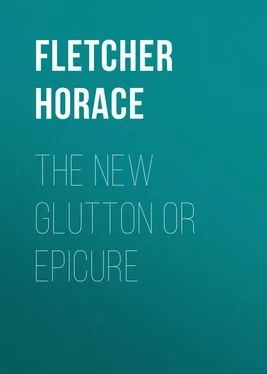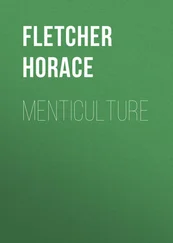Horace Fletcher - The New Glutton or Epicure
Здесь есть возможность читать онлайн «Horace Fletcher - The New Glutton or Epicure» — ознакомительный отрывок электронной книги совершенно бесплатно, а после прочтения отрывка купить полную версию. В некоторых случаях можно слушать аудио, скачать через торрент в формате fb2 и присутствует краткое содержание. Жанр: foreign_antique, foreign_prose, на английском языке. Описание произведения, (предисловие) а так же отзывы посетителей доступны на портале библиотеки ЛибКат.
- Название:The New Glutton or Epicure
- Автор:
- Жанр:
- Год:неизвестен
- ISBN:нет данных
- Рейтинг книги:4 / 5. Голосов: 1
-
Избранное:Добавить в избранное
- Отзывы:
-
Ваша оценка:
- 80
- 1
- 2
- 3
- 4
- 5
The New Glutton or Epicure: краткое содержание, описание и аннотация
Предлагаем к чтению аннотацию, описание, краткое содержание или предисловие (зависит от того, что написал сам автор книги «The New Glutton or Epicure»). Если вы не нашли необходимую информацию о книге — напишите в комментариях, мы постараемся отыскать её.
The New Glutton or Epicure — читать онлайн ознакомительный отрывок
Ниже представлен текст книги, разбитый по страницам. Система сохранения места последней прочитанной страницы, позволяет с удобством читать онлайн бесплатно книгу «The New Glutton or Epicure», без необходимости каждый раз заново искать на чём Вы остановились. Поставьте закладку, и сможете в любой момент перейти на страницу, на которой закончили чтение.
Интервал:
Закладка:
"In one or two conversations you laid down your simple principles of economic nutrition. You told me that my food ought to be masticated thoroughly, until taste was eliminated, and that (my) liquid nourishment, if taken, ought to be similarly treated. You also told me that, taking food in this way, I might, without fear of consequences, give free rein to my appetite. To shorten my story, I'll say that in three months after the practice of these principles my symptoms had disappeared. Not only had my interest in my life and work returned, but my whole point of view had changed, and I found a pleasure in both living and working that was a constant surprise to me. For this, my dear Mr. Fletcher, I can never repay you. My only desire has been and is, to try and do for others in my practice what you did for me.
"Now I have since that time had occasional colds, headaches, and gouty pains; but, whereas formerly I could not explain their causes, I can now invariably trace them to carelessness in the buccal digestion of my food, and can soon shake them off. So much for my testimonial. Now for other matters.
"I do not know what may be the extent of the claims you are advancing in regard to the benefits accruing from the practice of your principles. If you, as you in justice may, claim even the widest benefits as surely following the practice of these principles, many will relegate these claims to the limbo where all such 'panaceas' are soon forgotten. They will err greatly if they do so. The seemingly simple procedure of insalivating one's food most carefully is not calculated to impress people with the fact that great permanent benefit follows. The subtlety of the changes that occur is due to the greatly increased action of a vital process, i. e. , of the admixture with the food-stuffs of saliva, in such quantities as to alter the chemical reaction of the initial stage of digestion. This initial change causes a consequent change of all the processes following it, and a change also in the final products of the entire process of digestion; the greatest change being, perhaps, the elimination of last-resort digestion by the intestinal flora (digestion by decomposition caused by bacteria), and consequent elimination from the body, of the toxins they produce. The life of an organism has been defined as 'the sum of all those inter-actions which take place between the various cells constituting the organism and their several environments.' (Harry Campbell.) The final products of digestion are absorbed into the blood stream, and go to form part of the 'several environments' of the cells. The individual cell, the various groups of specialised cells, such as the brain, nerves, muscles, bones, etc., in short, the whole organism is beneficially influenced and made more resistent to disease by the purity of a blood stream that no longer contains the toxins of bacterially digested food.
"The further investigation of your discovery by those competent will, I am confident, result in such a simplification of the rules for a healthy life that the medical profession, at present forced by a lack of knowledge of the vital processes of nutrition to base their treatment on the veriest empiricism, will then be able to teach all and sundry how to live. At present, all we can do is to treat and perchance cure for a time certain symptoms, allowing the patient to return afterwards to a mode of life that is really responsible for his malady. 'Disease is an abnormal mode of life.' (Harry Campbell.) The three factors in its causation are:
"( a ) Cell structure.
"( b ) Internal cell environment.
"( c ) External body environment.
"Heredity determines, to a very large extent, our cell structure, and consequently our body structure.
"Sanitary science regulates our external body environment as much as the artificial and noxious habits of so-called civilisation will allow. The mental and physical external body environments have also their effect on the organism.
"Your discovery of simple rules for an Economic Nutrition will control the internal cell environment. In doing this, the predisposition to disease is materially affected. The internal cell environment being free from toxic material, and the cell itself better nourished, the cell's resistance to disease is increased, the possible source of disease being limited to the external body environment.
"In concluding this endorsement I can promise, to each and all who may intelligently practise the principles of Thorough Buccal-Digestion, a complete knowledge of their body's food requirements, or, as a patient of mine tersely put it, they will learn the way to 'run their own machines.'
"Yours ever, "Ernest van Someren."Dr. Van Someren and the author, assisted by Dr. Professor Leonardi, of Venice, as Consulting Physiological-Chemist, and several colleagues, pursued some experiments during the winter of 1900-1901; and Dr. Van Someren read a paper on our work, entitled, "Was Luigi Cornaro Right?", before the meeting of the British Medical Association the following August.
The paper is too long to reprint here but it will be found in full in another volume, entitled, "The A.B. – Z. of Our Own Nutrition."
The following "Note" by Dr. Professor, Sir Michael Foster, K.C.B., M.P., F.R.S. etc., is a further link in the chain of development of appreciation of the need of serious attention to the science of human nutrition excited by this initiative. (Dr. Foster is the Permanent Honorary President of the International Congress of Physiologists.)
EXPERIMENTS UPON HUMAN NUTRITION
"In 1901 Dr. Ernest Van Someren submitted to the British Medical Association, and afterwards to the Congress of Physiologists at Turin, an account of some experiments initiated by Mr. Horace Fletcher. These experiments went to show that the processes of bodily nutrition are very profoundly affected by the preliminary treatment of the food-stuffs in the mouth and indicated that great advantages follow from the adoption of certain methods in eating. The essentials of these special methods, stated briefly and without regard to certain important theoretical considerations discussed by Dr. Van Someren, consist of a specially prolonged mastication which is necessarily associated with an insalivation of the food-stuffs much more thorough than is obtained with ordinary habits.
"The results brought to light by the preliminary experimental trials went to show that such treatment of the food has a most important effect upon the economy of the body, involving in the first place a very notable reduction in the amount of food – and especially of proteid food – necessary to maintain complete efficiency.
"In the second place this treatment produced, in the experience of its originators, an increase in the subjective and objective well-being of those who practise it, and, as they believe, in their power of resistance to the inroads of disease. These secondary effects may indeed be almost assumed as a corollary of the first mentioned; because there can be little doubt that the ingestion of food – and perhaps especially of proteid food – in excess of what is, under the best conditions, sufficient for maintenance and activity, can only be deleterious to the organism, clogging it with waste products which may at times be of a directly toxic nature.
"In the autumn of 1901 Mr. Fletcher and Dr. Van Someren came to Cambridge with the intention of having the matter more closely inquired into, with the assistance of physiological experts. The matter evoked considerable interest in Cambridge, and observations were made not only upon those more immediately interested, but upon other individuals, some of whom were themselves medical men and trained observers.
"Certain facts were established by these observations, which, however, are to be looked upon as still of a preliminary nature. The adoption of the habit of thorough insalivation of the food was found in a consensus of opinion to have an immediate and very striking effect upon appetite, making this more discriminating, and leading to the choice of a simple dietary and in particular reducing the craving for flesh food. The appetite, too, is beyond all question fully satisfied with a dietary considerably less in amount than with ordinary habits is demanded.
Читать дальшеИнтервал:
Закладка:
Похожие книги на «The New Glutton or Epicure»
Представляем Вашему вниманию похожие книги на «The New Glutton or Epicure» списком для выбора. Мы отобрали схожую по названию и смыслу литературу в надежде предоставить читателям больше вариантов отыскать новые, интересные, ещё непрочитанные произведения.
Обсуждение, отзывы о книге «The New Glutton or Epicure» и просто собственные мнения читателей. Оставьте ваши комментарии, напишите, что Вы думаете о произведении, его смысле или главных героях. Укажите что конкретно понравилось, а что нет, и почему Вы так считаете.












